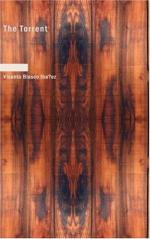But the music and the acclamations were drowned by a deafening crash, as if the island had suddenly burst into a thousand pieces, dragging the city to the depths of the Abyss. The square was shooting a fusillade of lightning flashes, a veritable cannonade. Those ancient arms, blunderbusses, muzzle-loaders, pistols, crammed full of powder, could roar like artillery. All the guns in the neighborhood were saluting the appearance of the Saint. And the crowd, drunk with the smell of powder, began to shout and gesticulate in the presence of that bronze image, whose round, kindly face—that of a healthy well-fed friar—seemed to quiver with life in the light of the torches.
Eight strong men, almost naked, came forward staggering under the weight of the metal saint. The crowd surged against them, threatening to upset the statue. But two bare-breasted strong-armed boys, devotees of the patron, were marching on either side, and they fought the multitude back.
The women, shoved hither and thither and almost suffocated in the jam, burst into tears as their gaze fell upon the miraculous image.
“Ay, father San Bernardo! Father San Bernardo! Save us! Save us!”
Others dragged children out from the folds of their skirts, and held them out above their heads toward the powerful guards.
“Lift him up! Let him kiss the Saint!”
And those muscular peasants would pick the children up like dolls, now by an arm, now by a leg, now by the nape of the neck, raise them to a level with the saint, that they might kiss the bronze face, and then toss them back into the arms of their mothers, working like automatons, dropping one child to seize another, with the regularity of machines in action. Many times the impact was too rough; the noses of the children would flatten against the folds of the metallic garb; but the fervor of the crowd seemed to infect the little ones. They were the future adorers of the Moorish monk. Rubbing their bruises with their soft little hands they would swallow their tears and return to their snug places in their mothers’ skirts.
Behind the glorious saint marched Rafael and the gentlemen of the Ayuntamiento with long wax tapers; and after them the curate, grumbling as he heard the first dashes of rain beat on the large red silk umbrella which the sacristan held over him, and felt the impact of the crowd of orchard-folk, that was mixed at random with the musicians. The latter, paying more attention to where they stepped than to their instruments, played a rather discordant march. Guns, meanwhile, continued to blaze away. The wild cheering for San Bernardo and his sisters went on; and, framed in a red nimbus of torch-light, greeted at every street-corner by a new fusillade, the image sailed along over that sea of heads, pelted by the rain, which, in the light of the candles, looked like a maze of transparent crystal threads. Around the saint the arms of the athletes kept ever moving, lifting children up to bump their drooling noses on the bronze of father San Bernardo. Balconies and windows along the way were filled with women, their heads protected by their skirts.




